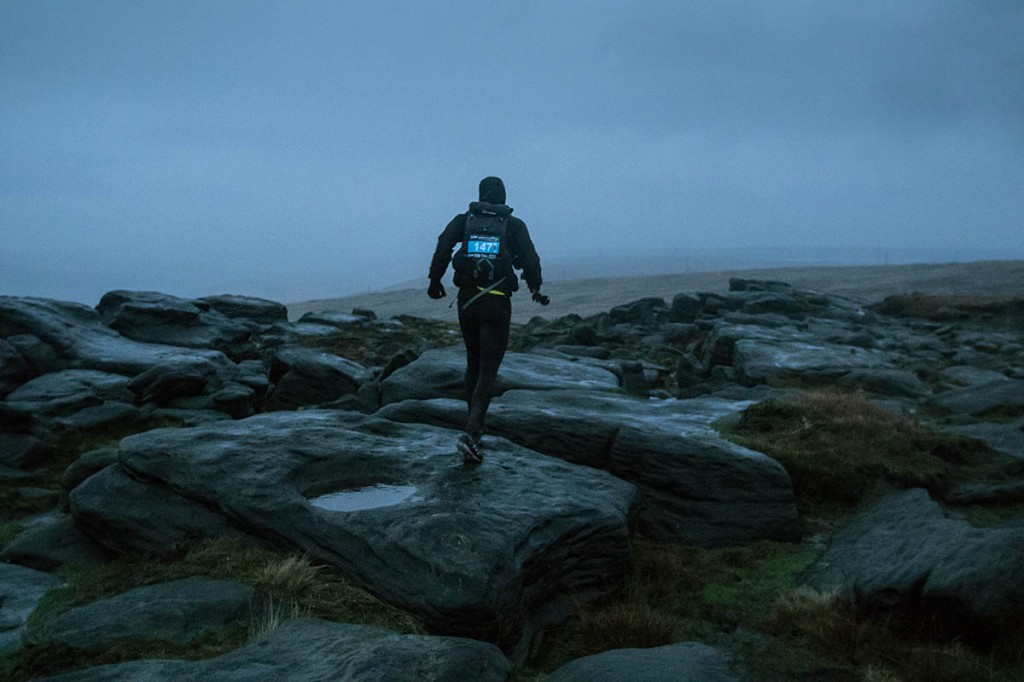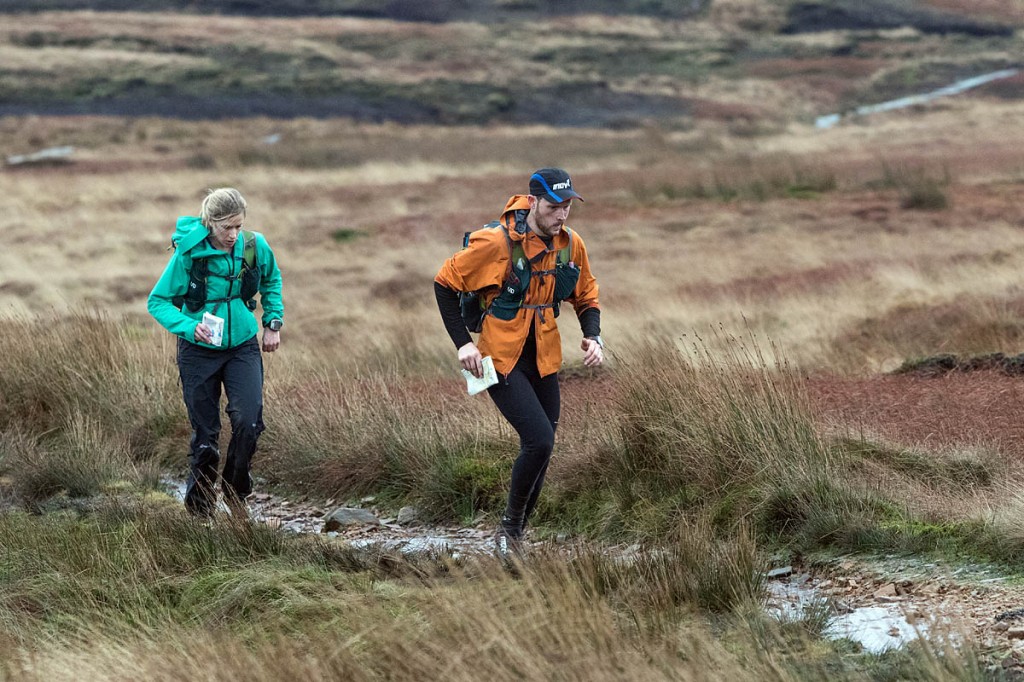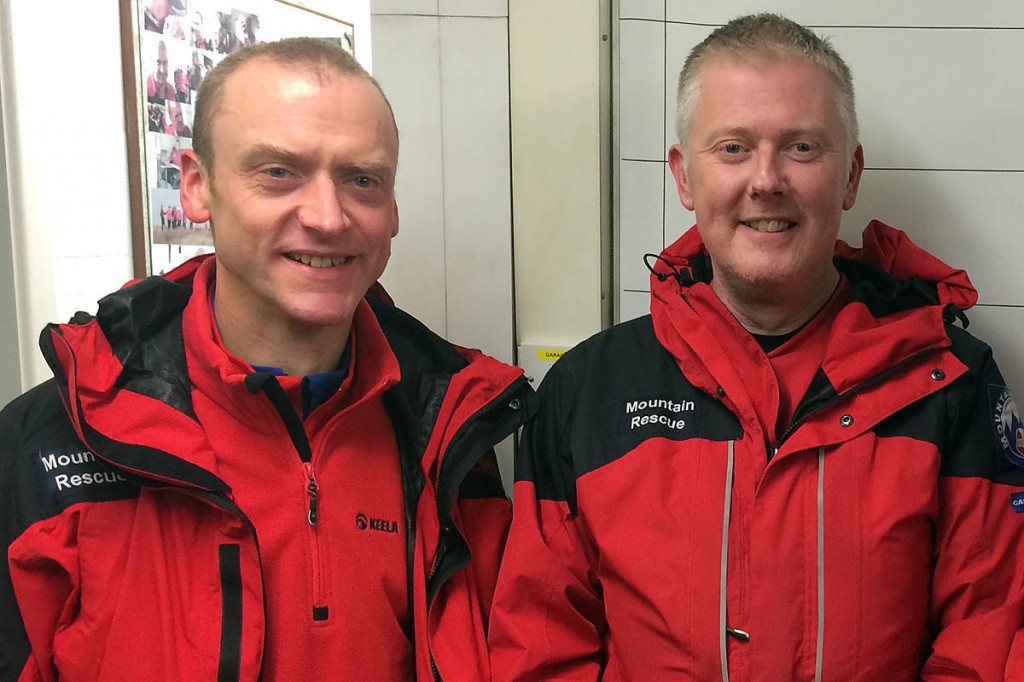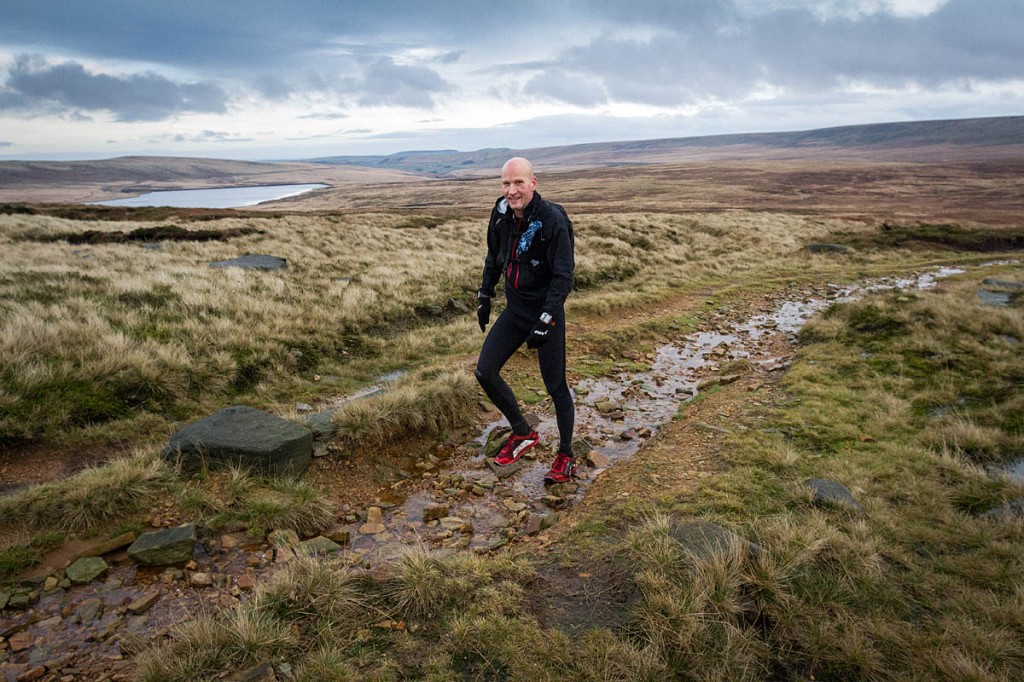
Shane Mooney negotiates Blackstone Edge as night falls in last year's Spine Challenger. Photo: Bob Smith/grough
As large areas of Britain are gripped by the year’s first true taste of winter, hardy athletes are gearing up to tackle the event dubbed the country’s most brutal race.
The Montane Spine Race involves running the full length of the Pennine Way in some of the most severe conditions likely to be encountered.
The race, and its shorter version the Montane Spine Challenger, begin this weekend, with 260 entrants registered to take part. There is also a separate challenge race for mountain rescue team members.
Last year’s Montane Spine Race winner and record holder, Irish runner Eoin Keith is due to take part, along with Czech competitor Pavel Paloncy, who is also a previous winner of the gruelling 420km (268-mile) race and who came second last year.
Participants are due to leave Edale at 8am on Sunday, heading for Kirk Yetholm in the Scottish Borders. Keith last year set the event’s fastest time, 95hrs 17mins, smashing the record by 15 hours.
Neither of last year’s joint women’s event winners Anna Buckingham and Zoe Thornburgh are on the starters’ list this year. The Montane Spine Challenger runners will set off from Edale at 8am on Saturday, following the Pennine Way to the finish line at Hawes in the Yorkshire Dales. The Montane Spine MRT Challenge is open to active mountain rescue team members in Wales, England and the Scottish Borders and follows the shorter 172km (108-mile) course.
The field includes many international ultrarunners, from countries including Japan, Australia, Canada and the United States, plus numerous European participants. Competitors in the longer race must complete the course, which involves 13,135m (43,094ft) of ascent, in no more than 168 hours. The Challenger course has 5,637m (18,494ft) of ascent and a time limit of 60 hours.
The inaugural Spine Race first took place in 2012 with only 11 entrants, of which only three ultimately crossed the finish line. Since then, the race’s notorious brutality has attracted competitors from around the world, attracting new racers each year who seek the next scalp on their endurance race hit list.
A set of stringent entry criteria ensures athletes do not enter ‘on a whim’ and are fully cognisant of the enormity of the undertaking.
Race directors Scott Gilmour and Phil Hayday-Brown have been the event’s driving force from the beginning. They said: “The Montane Spine Race was born out of a desire to test not just ultra-racing skills, but expedition skills.
“We watched as the ultra-distance race trend grew and grew and wanted to take that challenge to a whole different level, so we took an iconic trail route, added the usual demands of non-stop ultra-distance racing and set it in winter to give it real ferocity and bite.
“We knew that it would attract a much more hardcore type of athlete – those who are tough, self-sufficient, mentally resilient and able to function on limited sleep, who are physically at the top of their game and able to grapple with the full intensity of British winter.
“All the usual rules go out of the window and it comes down to survival. The Montane Spine Race is unique.”
The Spine Race has five main checkpoints, offering hot meals, medical support and somewhere to sleep, with intermediate checkpoints along the route. Runners can be tracked via GPS devices they carry, and they must all carry compulsory items such as a tent or bivvy bag, a stove, and two days of rations, all of which tend to weigh 5-10kg.

Matt Bennett and record holder Beth Pascall take part in The Spine Challenger in 2016. Photo: Bob Smith/grough
The current records for the Montane Spine Challenger are 29hrs 1min set by Marcus Scotney in 2014, with Beth Pascall’s 30hrs 18mins the fastest women’s time, achieved last year.
The Montane Spine MRT Challenge record is held by Tim Budd, with his 32hrs 10mins finish time from 2016, and Nicky Torr holding the women’s record with her 47hrs 30mins time from last year.
The Montane Spine Race women’s record is held by Debbie Brupbacher, with her 2015 time of 153hrs 17mins, though Beth Pascall set a faster time in 2015, 90hrs 59mins, in a race that was subject to forced stoppages and diversions because of severe weather.
Four women and 19 men are currently listed as starters in the mountain rescue team event, including two from Calder Valley Search and Rescue Team, one of the volunteer teams the area of which the race passes through.

Calder Valley SRT members Howard Barton and Jonothan Wright will take part in the event to raise funds for a new team vehicle. Photo: Calder Valley SRT
Howard Barton and Jonothan Wright will represent the Mytholmroyd-based team.
Members of the Oldham, Aberdyfi, Derby, Longtown, Glossop, Rossendale and Pendle, Kendal and Woodhead, teams are due to take part, along with those from the Cave Rescue Organisation, Border Search and Rescue Unit, Derbyshire Cave Rescue Organisation and Dartmoor SRT Plymouth.
